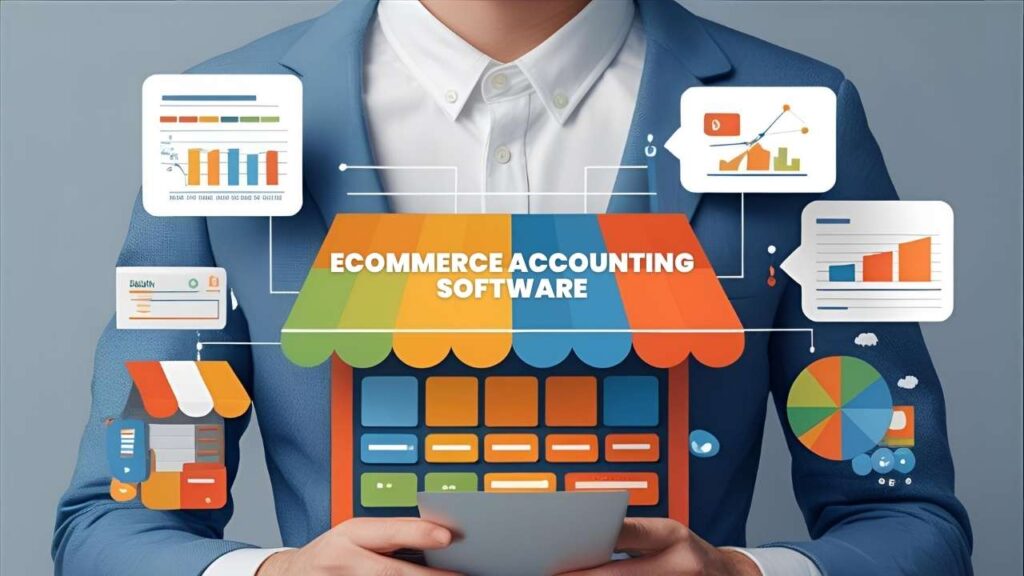You can manage all of your transactions using eCommerce accounting software, which can also generate financial statements. You probably already have an idea how important this is to any business, but eCommerce adds some special accounting challenges. Depending on your online business, you may need to monitor a high volume of online transactions.
This would quickly become unmanageable if you were working with a paper accounting system and trying to do it all yourself. By connecting with your seller platform and uploading transaction information automatically into its system, eCommerce accounting software minimizes this administrative workload. These imports will accelerate bookkeeping and reduce the likelihood of data entry errors in transmitting your data. In the rare case you’re audited by the government, that correct data comes in handy.
Using the best accounting software for eCommerce business is imperative to your business if you want to avoid hours and hours of data entry and be prepared for tax time. But if you are new to your ecommerce company and searching for the best accounting software, then there are quite a few around.
In this article, we have compared the top 10 ecommerce accounting software to assist you in making the correct choice.
What is eCommerce accounting software?
Accounting software for eCommerce is not like common accounting software. It encompasses everything related to virtual shops and e-commerce so that your company is taxed appropriately. It would be wise to choose accounting software with features beneficial for e-commerce companies at this point.
Methods to Reduce Your Audit Risk
With the right accounting software for ecommerce business india , can beat many issues. It is just a matter of comparing the critical features when looking for the most suitable solution. You might be surprised to hear that some rudimentary features might not be supported, even if you would expect all eCommerce accounting software to support everything you might need. The main features are the following:
Platform Integrations
The eCommerce platforms, e.g., Squarespace, Shopify, BigCommerce, and WooCommerce, should be easy to connect with your eCommerce accounting software. It should also be easy to connect with other third-party tools, such as those for contract management, employee expenses, and other areas of your business. You can update your inventory levels, taxes, received payments, and more automatically using these integrations.
Comprehensive Reports
Most popular accounting programs offer basic reporting. You will need enhanced reporting if you project substantial growth for your eCommerce site, particularly in inventory reporting, which you must get on a weekly and monthly basis.
Sales Tax Configuration
Sales tax is often quite confusing for online sellers. It ought to be as easy as possible to charge and account for sales tax within your accounting program so that you will avoid any miscalculations and discrepancies during its calculation.
24/7 Support
When your company’s backend accounting is handled by a single program or application, round-the-clock support is required. To determine how well a software company’s customer assistance performs, it is crucial to read support ratings and reviews.
The 10 best ecommerce accounting software in India for 2025
1. QuickBooks Online
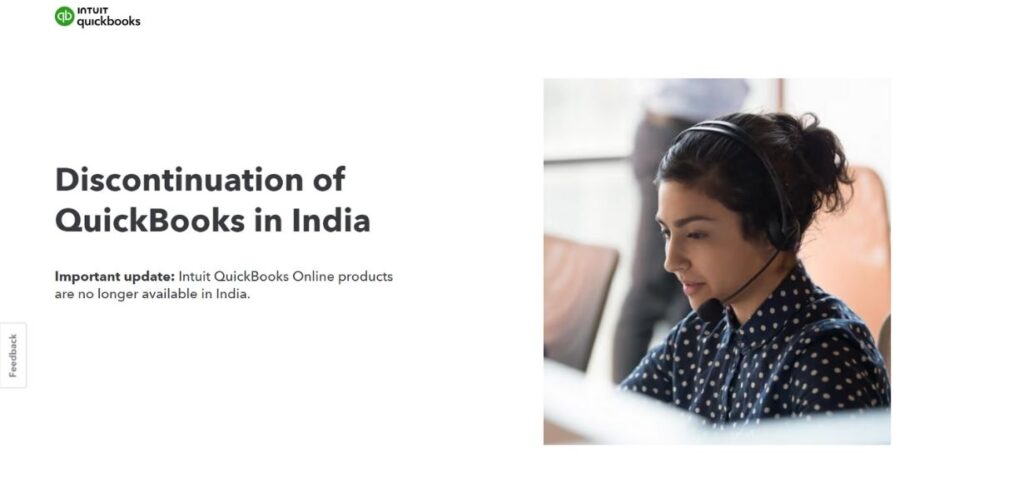
One of the greatest eCommerce accounting software for small and medium-sized businesses is named QuickBooks. With features such as tracking expenses, tracking bills, due dates, and reporting, it has both on-premises accounting software and cloud-hosted versions. You will find that QuickBooks offers all the features you need to track your inventory, taxes, expenses, and more accurately. All these features are designed to cater eCommerce businesses. Since it provides native integrations with popular eCommerce stores such as Shopify and BigCommerce, QuickBooks must be considered.
Features:
- Live expert tax assistance
- Accounting automation integrations
- Process and task automation
- Free guided setup
Pros:
- Provides assistance with a variety of integrations and add-ons
- Extremely flexible reporting framework
- Simple to set up
- Outstanding payroll support
- Calculates hybrid sales taxes
Cons:
- Customer service could be better
- Limited mobile app functionality
- New users may find the dashboard to be a little cluttered
Pricing:
- Simple Start: $15
- Plus: $45
- Advanced: $100
2. Wave Accounting
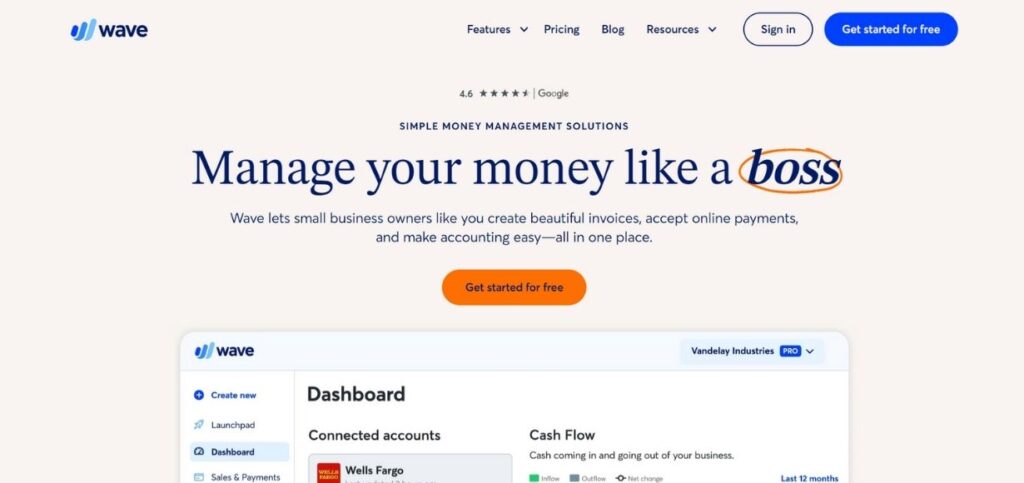
Owners of eCommerce businesses can benefit greatly from Wave, a complete eCommerce accounting software created specifically for small companies. Wave is a fantastic option if you’re looking for a comprehensive solution to optimize your financial accounting, tax filings, and invoicing. It is the ideal accounting program for business owners that need fine-grained control over their accounts. The dashboard enables you to manage payroll, invoices, and prepayments from a central platform and gives you accurate data regarding your expenses and revenues. Wave enables professional invoice design free of cost and syncs with Shopify or WooCommerce online store in a jiffy. Accounting software and invoice system are two different Wave product lines.
Features:
- Free plan available
- Unlimited income and expense tracking
- Customizable templates
- Send invoices from the mobile app
Pros:
- Use is free
- Double-entry accounting is used
- Excellent user interface
- Support for multiple currencies
Cons:
- Templates have restricted usability
- The mobile app’s functionality is limited
- Customers cannot receive discounts through Wave’s restricted time-tracking tools
Pricing:
- Starter: $0
- Pro: $16
3. Xero
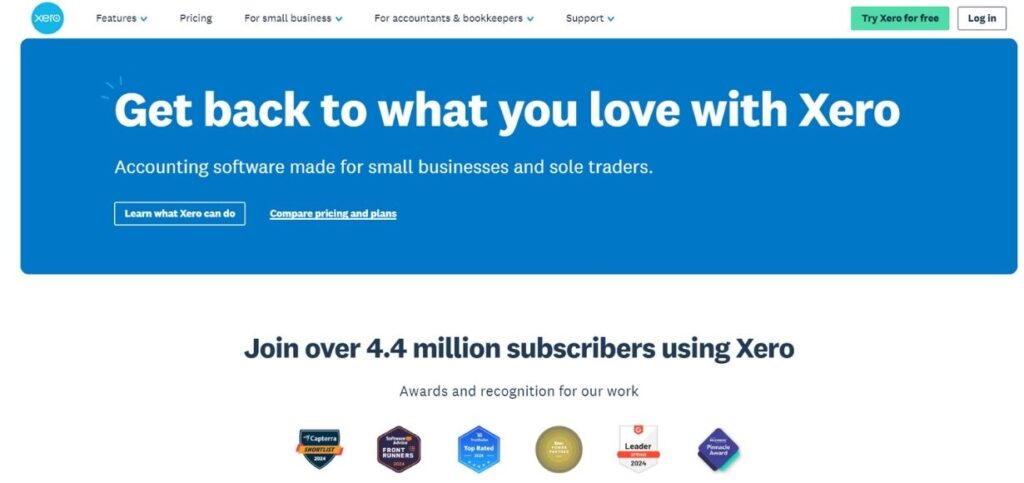
Xero is an internet-based accounting software for ecommerce sellers india and emerging businesses. Small business owners can instantly get an insight into their finances due to Xero, which brings them close to their advisors. Xero can be used from any internet-enabled device as it is an internet-based software. Small businesses can view their account details, transactions, and cash flows from anywhere in the world with Xero’s advanced accounting capabilities. All the bank transactions are automatically imported and coded. Online bill pay can help you handle your incoming costs and finances better and build stronger relationships with suppliers of key business supplies.
Features:
- Inventory and stock management
- Bank reconciliation
- Contact database and segmentation
- Invoicing and payments
- Payroll
- Mobile apps available
Pros:
- Reasonable prices
- Simple to use
- Connects to all significant banks
- Reports are simple to view and adjust
Cons:
- No telephone help as customer service is provided by email
- Response from support may take more than 24 hours
- When automatic reconciliation fails, you must manually review the transactions
- Team members need their user permissions to be expanded more
Pricing:
Affordable monthly plans based on business needs.
4. Bench Accounting
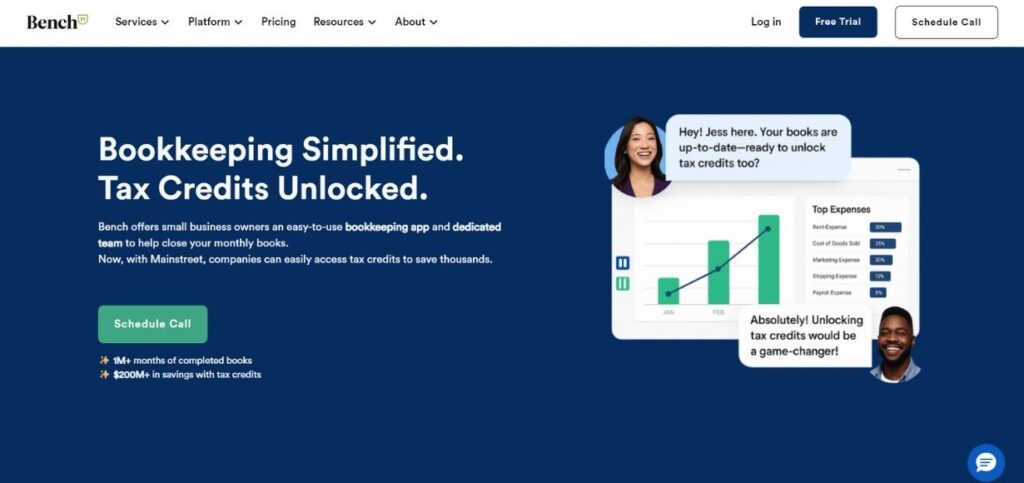
Bench is a comprehensive eCommerce accounting software service that gives you the same visually reported accounting as the rest of the applications on this list, with the additional advantage of having a professional bookkeeper you can call when you need them.
Bench integrates with your chosen bank accounts and payment processors, in addition to larger e-commerce systems such as Shopify, BigCommerce, and even Amazon. Since Bench not only handles importing transactions but also manages the administrative side of bookkeeping, you’ll achieve the same accuracy as the other key players while saving much more time.
Pros
- Integrates with multiple eCommerce platforms
- Professional help whenever you need it
- Simple dashboard layout
Cons
- Prices can be high compared to other solutions
- Limited mobile app functionality
Pricing:
Affordable monthly plans based on business needs.
5. Freshbooks

FreshBooks started life basically as an invoicing software, but it has now come a long way. FreshBooks still operates more smoothly with service-based eCommerce companies such as custom crafts, online coaching, or other one-off online companies, although it now includes most accounting features. To save time and reduce errors, FreshBooks, similar to QuickBooks, can link with your bank account and payment gateways to download transaction information automatically.
Even the most significant financial statements are accessible, such as cash flow statements, profit and loss statements, and balance sheets. FreshBooks’ strongest suit, though, is its project management tools. You can set up projects in FreshBooks, monitor the amount of time you or your employees work on them, and then seamlessly transfer that information into invoices once the project is finished. If your eCommerce business sells made-to-order products or hourly work, this feature can be fantastic.
Features:
- Send invoices, scan receipts, and track mileage via mobile app
- Integrates with over 100 third-party apps
- Phone support Monday through Friday
- Inventory and billable items tracking
Pros:
- Provision of project management tools
- Integration with your existing payment platforms
- Customizable invoice templates
Cons:
- A learning curve is required for most business owners
- It does not provide automatic sales tax changes based on the location of the buyer or inventory management
- It lacks native eCommerce platform integration, making it a bad choice if you sell physical items
Pricing:
- Lite: $19
- Plus: $33
- Premium: $168
6. Kashoo
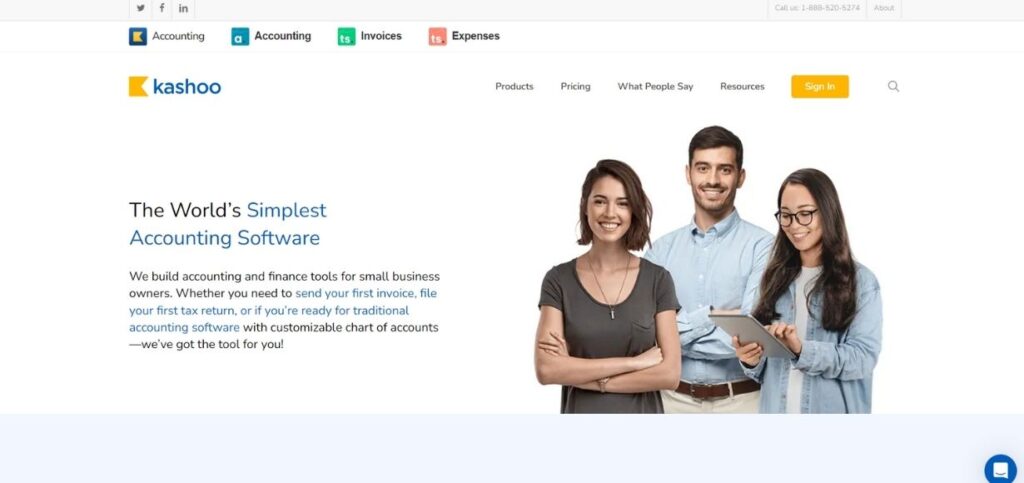
Much of accounting work in smaller businesses is taken care of automatically by the excellent eCommerce accounting software , Kashoo. It organizes and classifies transactions automatically, which can save you heaps of time and money. Moreover, Kashoo provides a wise inbox that monitors and prioritizes emails from the merchants you frequently trade with. The Kashoo smartphone app can scan receipts, digitize them, and sort them automatically employing OCR technology.
This is noteworthy since it bars you from inputting duplicate payments into your system. Kashoo further sorts out payments automatically into accounts that get frequently audited, so that when the taxman comes round, you would not have paid extra taxes on top of that which you already ought to be paying.
Features:
- Includes recurring invoicing and automatic bank reconciliation.
- Automates transaction categorization for efficiency.
- Prioritizes emails from regular vendors for streamlined communication
Pros:
- Regular updates
- Adequate for tracking income and expenses
- The free version is available for smaller organizations
- Good selection of templates
Cons:
- There is no typical dashboard; instead, everything is separated into tabs
- Android app development is ongoing
- There are only a small number of integrations
Pricing:
Affordable monthly plans based on business needs.
7. Zoho Books
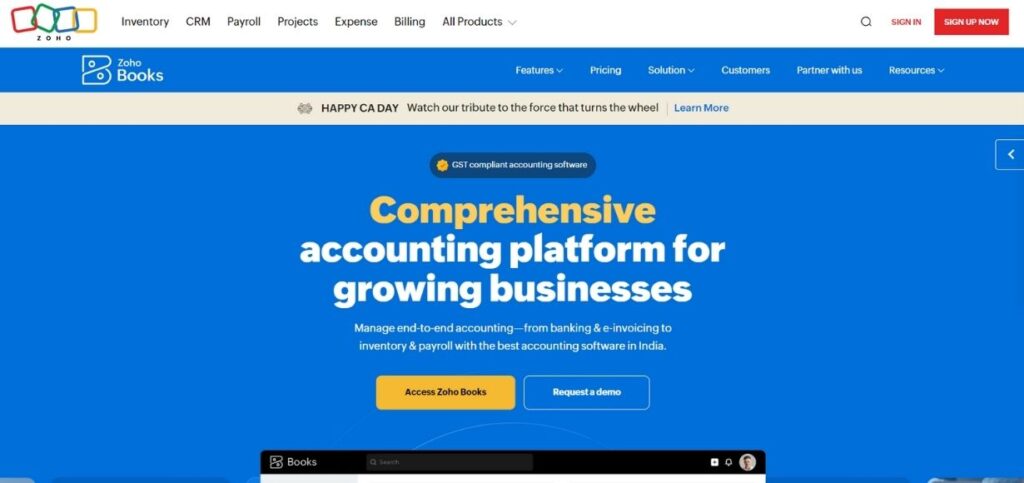
The Zoho software suite was designed with all sizes of businesses in mind. They offer a set of productivity applications aimed at entrepreneurs and marketers. Not surprisingly, their financial services product targeted towards small businesses is named Zoho Books. For business owners already using Zoho for their online store, it is easy to integrate Zoho Books into their system. It offers useful tools for payroll management, invoices, estimating, expense tracking and numerous other activities.
Zoho Books is an excellent choice if you wish to automate processes in your accounting department. You don’t need to worry about performing such time-consuming tasks yourself since Zoho Books provides an end-to-end accounting solution, ranging from tracking deals to sales orders. And on top of that, Zoho Books also provides convenient reporting features that allow you to view a clear picture of how your business is performing.
Features:
- Free plan available
- Live chat support
- Inventory and invoice management
- Workflow rules for transactions
Pros:
- Assistance with all the popular payment gateways
- Tracks time taken to perform various tasks
- Renowned in the commercial sector for their assistance services
- Provides extensive form customization and administration tools
Cons:
- Payroll features are not accessible nationally or internationally
- There are only a few choices for integration
Pricing:
- Standard: $15
- Professional: $40
- Premium: $60
- Elite: $120
- Ultimate: $240
8. Sage Accounting

Sage Accounting is perhaps the most feature-rich system available. For those unfamiliar, Sage is one of the best-known brands available in the market for eCommerce accounting software in India . Sage is incredibly easy to understand if you’re an accountant. Sage often feels like a system created more for accountants than for small business owners.
But there are a few features missing that you would commonly find in other packages, including time tracking and order management. Sage gives you several registration tools as soon as you sign up, so you can quickly set up your tax return options as well as your sales and expense options.
It employs double-entry bookkeeping, which is a benefit to accountants and the user experience is fairly straightforward and uncomplicated. That being said, a typical criticism of Sage is that, compared to other established brands such as Zoho Books or QuickBooks, the user interface looks somewhat out of date. Sage also offers decently produced mobile apps for iOS and Android, along with other offerings.
Features:
- Provides audit trails
- Accommodates multiple companies
- Streamlined bank reconciliation
- Order process workflow
Pros:
- Really simple to set up
- Streamlined interface
- Provides choices for project tracking
- Decent mobile applications on both iOS and Android
Cons:
- The UI appears dated
- No timekeeping
- Limited report customization options
Pricing:
- Pro: $59
- Premium: $97
- Quantum: $160
9. Netsuite
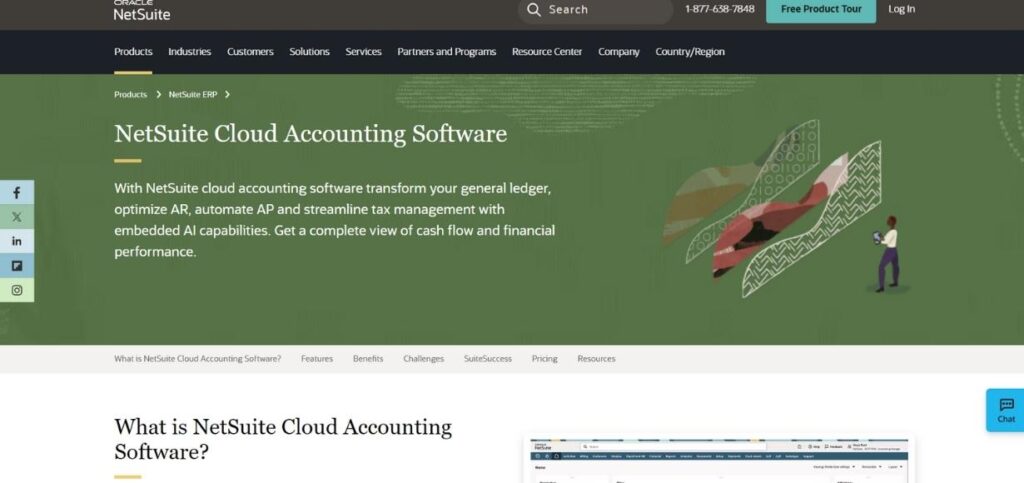
NetSuite cloud accounting and financial software, designed for large enterprises, help finance professionals plan, re-engineer, and automate their processes and operations. Core accounting and finance processes are integrated with efficient compliance management in NetSuite. This integration reduces back-office expenses while enhancing financial close productivity and company performance. It would be prudent to explore NetSuite if you manage a large company with global operations.
Features:
- Mobile app
- Automatic transaction categorization
- Automatically generate purchase orders when stock is low
- Customer relationship management tools
Pros:
- Top software for huge businesses
- Provides a variety of capabilities not seen in other accounting software and supports global accounting if your business operates internationally
- Provides compliance support for ASC 606, GAAP, SOX, and other standards
Cons:
- Due to cost, this is not a good option for small to medium-sized organizations
- If you want all of NetSuite’s functionality, you’ll need multiple of their software solutions
Pricing:
- Self: $9
- Pro: $19
- Plus: $29
- Team: $69
- Unlimited: $169
10. FreeAgent
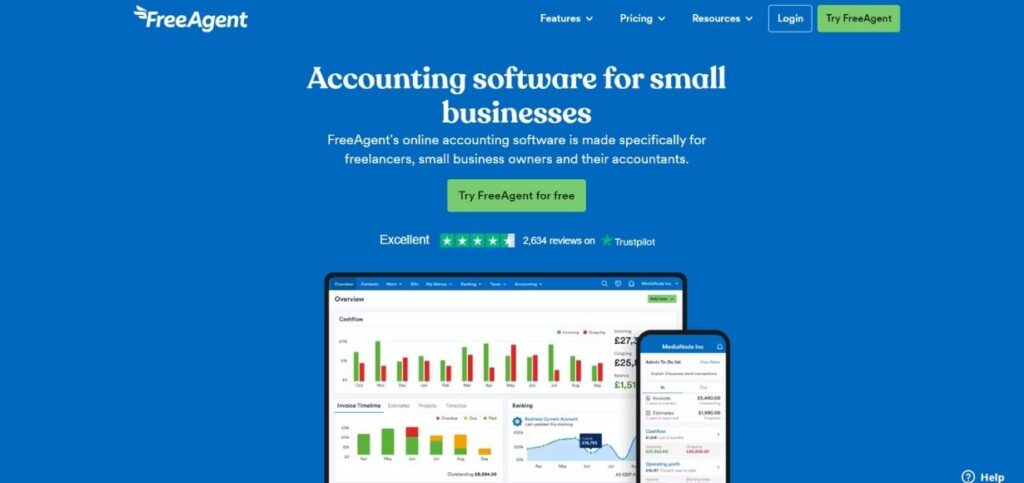
Invoices, expenses, payroll, tax returns and other accounting tasks can be managed by small business owners with the help of FreeAgent, an accounting tool based on the cloud. It also allows you to create recurring invoices which can be sent automatically, customise expense categories to get an accurate view of your accounts and measure and track all your information in a centralised dashboard.
Features:
- Estimates and invoices
- Expense, income, and profitability reporting
- Time tracking
- Reporting dashboard for taxes, expenses, and more
- Bank connections for transaction imports
Pros:
- Simple to use
- Free pricing strategy is offered
- Updates frequently with new features
- Outstanding tax reporting capabilities
Cons:
- Pricey compared to rivals
- More template choices are required
- Lack of round-the-clock assistance
Pricing:
Affordable monthly plans based on business needs.
How to Choose the Best Accounting Software for eCommerce businesses?
No two ecommerce businesses are the same, and neither are any two software. The following top features are most important to look at when considering the tool right for your company.
Ecommerce platform integrations
When speaking about ecommerce platforms, integrated processes save time in handling the bookkeeping for these business owners. The best kind of software would allow sellers with online storefronts to transfer orders, information regarding those orders, or even information on the buyer.
Point of sale and payment processing integrations
Accounting software must simplify payment processing and minimize accounting workload. Online retailers should also think about whether or not their POS system is integrated with their accounting solution of choice. Simplifying systems can free up time to spend on growth and customer satisfaction rather than record-keeping.
Sales tax compliance capabilities
Tax regulations are complicated enough and continuously evolving. Ecommerce sales tax compliance is something sellers must understand, and to top it off, they have to know how and when to remit without incurring penalties.
Their selected accounting solution should provide them with solid tax reporting and compliance functionality to stay on top of it and stress-free.
Conclusion
For online store owners, having good eCommerce accounting software is important now more than ever. When tax time comes around, you don’t want to be scrambling at the last minute. Having all reports available when you need them is always a good thing. Any of these 10 great solutions will suffice as accounting software, so pick the right one for your needs.
Frequently Asked Questions
1. How to make ecommerce accounting easier?
Make ecommerce accounting easier using specialized ecommerce accounting software that provides automation, integration features, and strong reporting functionality. Look for options such as Xero, QuickBooks, or dedicated ecommerce accounting software specific to your business requirements.
2. Is QuickBooks suitable for ecommerce?
Yes, QuickBooks is a favorite among ecommerce companies because of its robust features, integration options, and scalability. It has a variety of tools to handle finances, inventory, and sales, making it ideal for expanding ecommerce businesses.
3. How do I configure sales tax for ecommerce?
Including sales tax on e commerce involves knowing the taxing laws and tax codes in your area, coding your ecommerce website to calculate and apply sales tax, and paying the collected taxes to the taxing agency regularly. Ecommerce accounting packages usually contain automatic sales tax calculation and compliance within the package.
4. Will my ecommerce software work with ecommerce accounting software?
Yes, majority of the ecommerce accounting software solutions provide integration with big ecommerce websites such as Link My Books, Shopify, WooCommerce, Amazon, eBay, etc. Integration ensures the ease of data sync from your ecommerce platform and bookkeeping solution to produce right finance reports for you.
5. Which accounting software is best for ecommerce businesses ?
In the process of choosing the most ideal bookkeeping program, a combination of Link My Books and Xero or QuickBooks is highly recommended.Both Xero and QuickBooks are popular for their robust features, user-friendly interfaces, and highly integrated capabilities, which make them ideal for different bookkeeping needs. The integration with Link My Books makes them even more robust, particularly for individuals who do ecommerce accounting.
